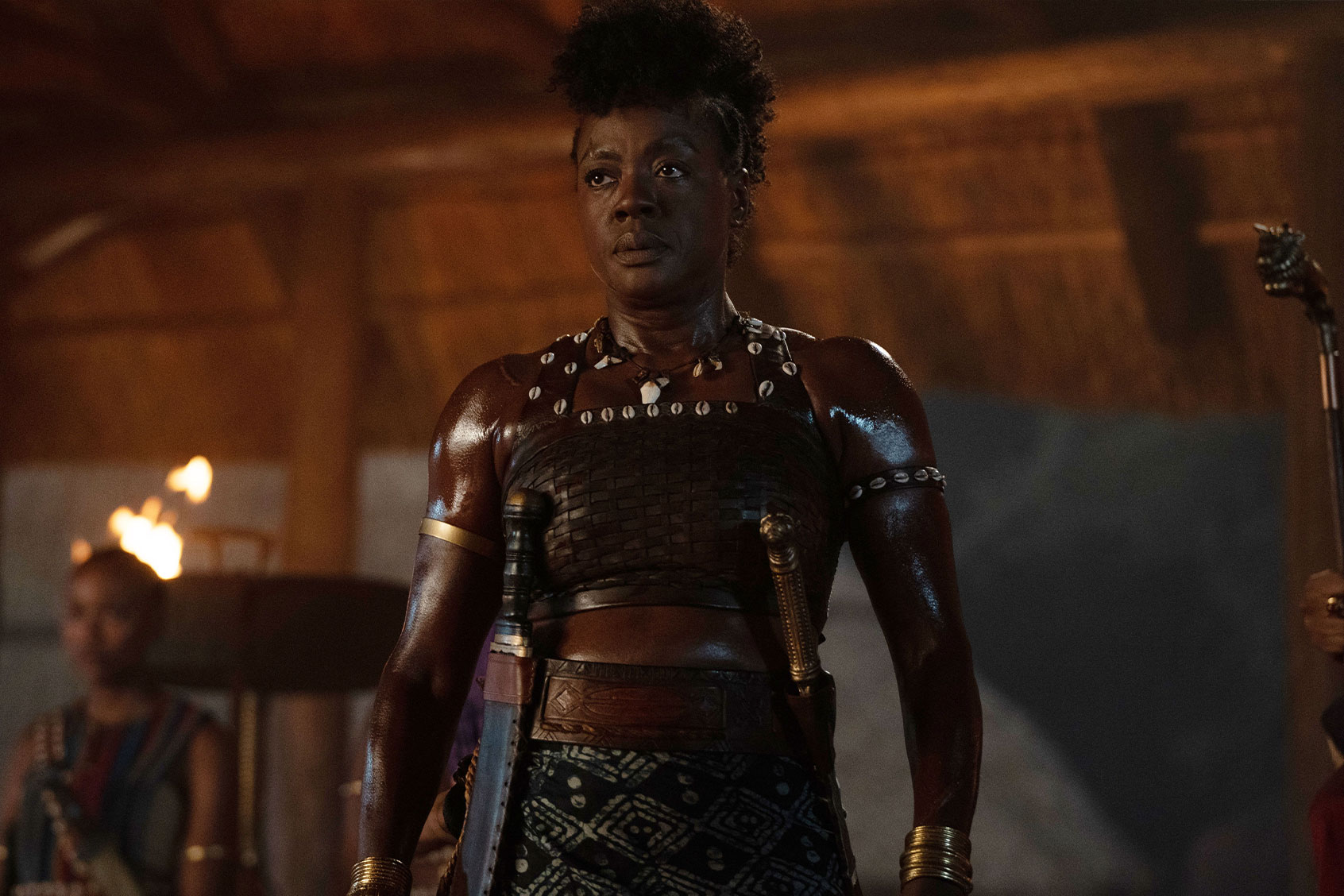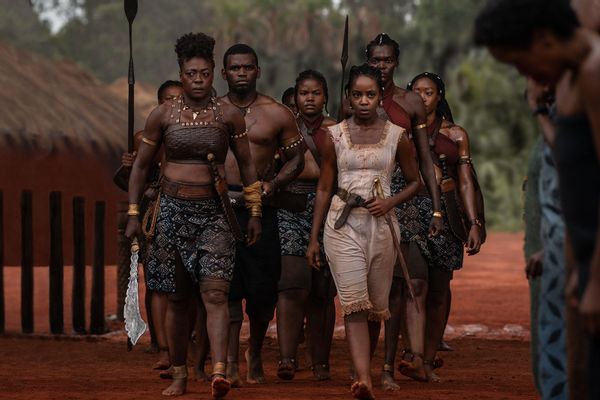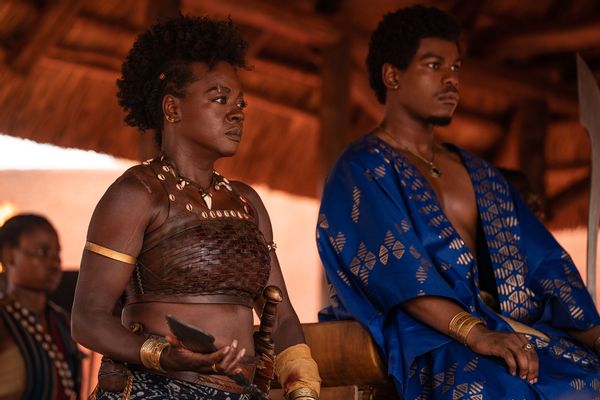
Every action movie worth contemplating after you leave the theater asks the audience to think but not overthink, to appreciate the hero's righteousness without questioning the troublesome parts of the story that may get in the way of cheering them on. We're reminded that these are power fantasies, even the ones based on actual events – histories that are chosen by producers and studios for their potential as inspiring spectacles.
Even taking all of this into account, "The Woman King" was never destined for an easy welcome free of controversy. Though director Gina Prince-Bythewood ("The Old Guard") drew inspiration from "Gladiator" and "Braveheart" (influences that play to incredible effect in the movie's massive, fast-paced battle sequences), it's an epic set in a period and place about which most Americans know little – a 19th-century West African kingdom of the Dahomey.
Viola Davis' Nanisca leads a unit of women warriors known as the Agojie, flanked in battle by her trusted officers Izogie (Lashana Lynch) and Amenza (Sheila Atim). Nanisca and her fighters are so fearsome that civilians in the kingdom she serves are forbidden to look at them directly when they march by. And the king she serves, Ghezo (John Boyega), places her counsel on the same level as that of his male advisors – only one of the many ways the movie demonstrates Ghezo's enlightened view of governance.
Ghezo has many wives, but he also venerates Nanisca and the Agojie, women who pledge loyalty to each other along with taking a vow of celibacy in exchange for training to become expert killers in the name of protecting their people.
The way history tells it, the Dahomey weren't so much in need of protection from outside threats as it was the other way around. They built their kingdom's massive wealth by capturing and selling other human beings long after the British declared the slave trade to be illegal.
"The Woman King" does not hide the Dahomey's role in fueling chattel slavery, as many critics and fans have explained. It rearranges and polishes the truth to allay our doubts about its protagonists' heroism.

Nanisca, Izogie and Amenza urge Ghezo to stop selling prisoners to the Portuguese slaves who trade with them – even the people they capture from their (sexist, leering) rival the Oyo. Having seen the cost of war and contributed to that suffering, she believes that the Dahomey can sustain their wealth by cultivating and trading palm oil to surrounding territories.
Also in the movie, Nanisca and her sisters have principles on the battlefield. While raiding a village they suspect has taken some of their people as prisoners, they slice through most of the men they find. When they come across a house full of cowering girls and women, however, they allow them to live. Those they take captive are given the option to join them or die. Wait, no . . . that's probably what would have happened in reality. In "The Woman King," they're allowed to leave in peace, unmolested.
If you're a student writing a term paper about the Dahomey, copying the plot of Dana Stevens' screenplay should net you a failing grade.
I could go on, but honestly, what's spelled out above is enough to make my point: If you're a student writing a term paper about the Dahomey, copying the plot of Dana Stevens' screenplay (written from a story by actor Maria Bello, who pitched the idea) should net you a failing grade.
But if you're someone who loves action movies that use "true events" as an entry to a deeper narrative about surviving trauma, defying misogyny and overcoming personal torment in the face, along with all the ass-kicking, then "The Woman King" is a masterpiece.
Critics love it. Audiences polled by CinemaScore gave it an A+, making it one of only two movies to achieve that rating so far in 2022. The other is "Top Gun: Maverick."
But that record-shattering paean to the military – and Tom Cruise – didn't leave me in awe of its performances. Davis did, along with Thuso Mbedu's journey as Nawi, a dismissed young woman who joins the Agojie after her parents throw her to the king's mercy. Nawi is the stand-in for every woman who's been told she's difficult or called unruly; her mother and father deliver her to the palace because she refuses to marry. (But then, the man her parents have matched for her is old, arrogant and slaps her moments after they meet. What's not to hate?)

Even if the Dahomey were, in historic fact, "the blade of freedom" Nanisca proclaims her people to be in a rousing pre-battle speech, the radical sight of women beating men senseless in battle is enough reason for racist, sexist right-wingers and misogynistic men of color to team up to slander everyone involved.
Now consider that "The Woman King" features dark-skinned Black women in the respected role of elite warriors, an image not seen onscreen en masse in . . . ever.
Consider that "The Woman King" features dark-skinned Black women in the respected role of elite warriors, an image not seen onscreen en masse in . . . ever.
And yet, the significance of "The Woman King" rewrite differs from that of other historic epics. "300," for example, makes the Spartans into defenders of liberty while portraying the Persians as monstrous hulks. It also conveniently leaves out the part about the Spartan coming-of-age ritual that involves killing a human slave.
Pretty much every Mel Gibson movie that purports to be based in history would make experts scream. None of those movies feature historic figures or cultures that have a direct link to a societal plague that millions want to pretend never existed, wasn't as bad as it was or has no bearing on America's structural inequity.
And that's the key concern Nikole Hannah Jones, creator of "The 1619 Project," voiced in an August tweet. "It will be interesting to see how a movie that seems to glorify the all-female military unit of Dahomey deals with the fact that this kingdom derived its wealth from capturing Africans for the Trans-Atlantic slave trade," Jones wrote.
That history shouldn't negate what Prince-Bythewood, David and the cast have achieved here. "The Woman King" proves that adapting the underexplored histories of African culture for the big screen can be a money maker. (The film exceeded its modest opening weekend box office expectations by earning $19 million.) And if Hollywood wants epic histories to adapt, the continent has plenty to offer.
The industry already knows this: After all, the Agojie inspired the Dora Milaje, T'Challa's royal guard in "Black Panther," but only concerning their battle prowess. (In fact, the box-office success of "Black Panther" in 2018 led to Sony's TriStar Pictures greenlighting "The Woman King.") Now, most people don't bother to look up the history behind the artistic inspiration, but those who do are still going to discover . . . history, in all its controversy and mess.
So the question becomes whether it's possible to enjoy a fiction "based on true events" featuring figures cleaned up to be better symbols than they were in reality – and whether we can hold the brutal truth of who these people were alongside the wish-fulfillment of who we want them to symbolize. I believe we can do both, appreciating the doors that the success of "The Woman King" may open to give future filmmakers a chance to tell other stories like it and do it even better.







